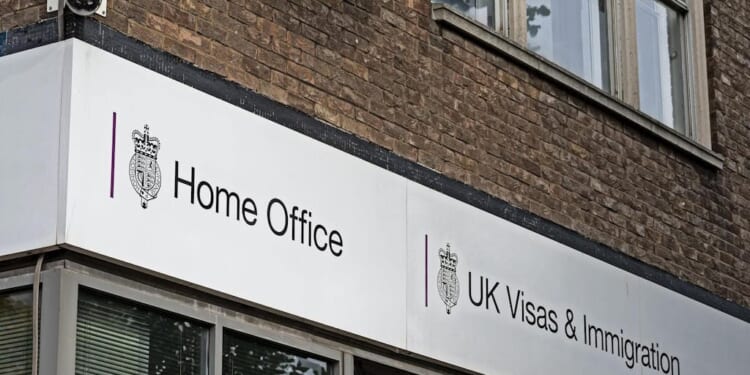This article is taken from the October 2025 issue of The Critic. To get the full magazine why not subscribe? Get five issues for just £25.
There can be few people in Britain who think that our system of immigration and asylum law achieves what they would like it to. Readers of the Daily Telegraph will be familiar with its regular churn of stories with eye-catching headlines about the perverse results of appeals in the tribunal system against Home Office decisions — for example, “Asylum seekers allowed to stay in UK despite lying in claims” or “Asylum seeker sold drugs days after deportation was cancelled” or “Migrant spared deportation because he has tattoos”, ad infinitum and ad nauseam.
Those who prefer data to lurid and often inaccurate stories can read the research of the Migration Observatory. In 2024, just over 5,000 foreign criminals were deported from Britain, out of the 10,321 foreigners in British prisons in 2023.
50 per cent is not the worst success rate imaginable, but the Home Office achieves most of its deportations to a small number of European countries. In 2024, Albanians and Romanians comprised 51 per cent of all deportees, and once you add in the Poles, Lithuanians and Bulgarians it adds up to 69 per cent.
Bad news for the East European criminal is balanced by better news for others — if you are one of the 300 or so Pakistani or Somali nationals doing time in a British prison, you can eat your porridge confident that when released, the chances of the Home Office forcibly taking you back are miniscule.

One might take some comfort from the fact that the human rights lawyers and open borders advocates aren’t very happy either. Freemovement.org.uk is a website about immigration and asylum law founded by Colin Yeo, a barrister who is a member of Garden Court Chambers. Founded in 1974, it says, “our approach is progressive. We help many clients use the law to advance social justice and equality.”
More than 50 members of garden court practise immigration and asylum law, including 9 KCs, and they hold a range of political views — there are plenty who are comfortable voting for Keir Starmer and just want to enjoy their holiday houses in peace, like any prosperous lawyer. But there are others such as Franck Magennis, whose “work centres on challenging rights breaches by the British and other states, employers and landlords” and who spends his leisure time addressing the Marxism Festival. He recently represented Hamas in an unsuccessful challenge to its designation as a proscribed terrorist group.
The view of the activists at Free Movement in a recent article about the dysfunctional asylum system was that:
The ban on the right to work, the destitution-level support offered instead, the squalid accommodation and camps and the highly bureaucratic, faceless asylum process all absorb vast Home Office resources to administer. These policies, which belong to a bygone age, deter no one. They merely serve to punish genuine refugees who will ultimately get to stay in the United Kingdom in the long term. It is their interests and ours to help them integrate as soon as possible rather than forcing them into this demeaning purgatory first.
So whose fault is it? Is it bad judges, bad lawyers, bad laws or something else entirely? Some would say we have the wrong people serving as judges in the tribunal system. In June 2024 the Judicial Appointments Commission appointed a dozen new judges of the Upper Tribunal Immigration and Asylum Chamber. It is not a bad gig — they get an excellent public sector pension, and the inflation-linked salary of £164,000 per year is about the same as the combined MP and ministerial pay of the Chancellor of the Exchequer.
Many of the judges have a background in left-wing legal practices such as Garden Court or its rival Doughty Street Chambers. One recent appointee is an alumna of Garden Court. She was previously a senior asylum appeals caseworker for Refugee and Migrant Justice, and Companies House records show she was for four-and-a-half years a director of Haringey Migrant Support Centre.
Another practised for many years at Garden Court before moving to Doughty Street. Highlights of her private practice included acting for Detention Action, a migrants’ rights charity which opposes the Home Office having the power to detain people pending their removal from the country.
The Home Office used to operate a scheme called the Detained Fast Track, which was intended to decide asylum appeals in an accelerated timeframe, during which the asylum seeker was held in a detention centre. In 2015, Detention Action, the future judge and her then Garden Court colleagues persuaded the High Court that the scheme had insufficient safeguards and was unlawful.

Another member of the class of 2024 used to be a solicitor representing asylum seekers, and later worked for the UN High Commission for Refugees. In January 2023, about 18 months before she was appointed as a full-time judge of the Upper Tribunal, she and a colleague gave evidence to the Joint Parliamentary Committee on Human Rights to criticise the Nationality and Borders Act 2022, legislation promoted by the Home Office under Suella Braverman.
The tribunals are left-coded places. The judges have a private room for reading and research, which can be furnished and decorated as they please. The personal touches are sometimes telling — the visitor might see an Anti-Nazi League membership card, a declaration from the 1871 Paris Commune. Books may include Memoirs of a Radical Lawyer by Michael Mansfield, a proselytising vegetarian and Jeremy Corbyn-supporting KC; or Eve was Framed: Women and British Justice by Baroness Kennedy, the rebellious Labour peeress previously known as Helena Kennedy KC and a founding member of Doughty Street.
But judicial life isn’t just about deciding appeals and attempting to read turgid books by vain socialists. There are also awaydays for training, typically held in unglamorous facilities in provincial cities such as Loughborough. The sessions include legal updates and, invariably, a session given over to diversity training. The favoured provider is a DEI consultancy called Half the Sky. Its name alludes to a saying of Chairman Mao that women hold up half the sky. It might seem strange to call your diversity business after the pronouncements of a psychopath whose reign of terror drove millions to flee China, but if the judicial delegates notice the contradiction, they do not comment on it.
In a session on how to be more inclusive, an example was given about playing football in an all-gender league: “We introduce ourselves and our pronouns, and we do not say ‘man on’ — instead we say ‘player on’ or ‘person on’ … I once instinctively said ‘man on’ by mistake, so I apologised afterwards. I felt really bad.” Delegates are told that people need to be free to be themselves, although whether that freedom should extend to gender-critical feminists, conservatives and other misfits is less clear.
It does not follow that just because someone used to represent asylum seekers and migrants or advocate for open borders, he or she is necessarily hostile to the Home Office. Judges are required to apply the law dispassionately — “without fear or favour, affection or ill-will”, in the words of the judicial oath. And the Upper Tribunal does not only recruit lawyers associated with the radical left.
One judge who recently retired from the Upper Tribunal had previously worked for the Treasury Solicitor and the Government Legal Department advising the Home Office. One of the 2019 appointees previously took instructions as a barrister on the Attorney-General’s panel of counsel, often advising and representing the Home Office, whilst another had worked as a lawyer for the Foreign Office.
But even if someone joined the bench with sympathy for lawful immigration control, dealing with the Home Office can erode that sympathy. Its record as a litigator can sometimes be as bad as its record at deporting Somali criminals.
One of its worst days in court recently concerned Ameena Al-Ashkar, a Palestinian academic and journalist. In 2019 the FCDO awarded her a Chevening Scholarship in order to study for a master’s degree at SOAS. When she later applied for a visa to commence her PhD at the LSE, she was refused and told that secret intelligence from national security sources indicated her presence would not be conducive to the public good.
In the subsequent court case the Home Office admitted no fewer than nine failings, including delays, failing to tell the tribunal about decisions it had taken, making false statements, breaching undertakings to the tribunal, and failing to admit non-compliance with undertakings. The judge commented the conduct of the case over 10 months was “shockingly poor”.
The judge ultimately decided not to make a finding that the Home Office was in contempt of court, but concluded nonetheless, “The Secretary of State stands rebuked for his admitted breaches.” The Home Office was ordered to pay the legal costs of that case for the two barristers and the solicitors who acted for Ms Al-Ashkar, as well as for its own legal team (one of whom was a KC). Though precise figures are not available, the bill for this carnival of maladministration will certainly run to many tens of thousands of pounds, and is likely to have gone into six figures.
Why cannot even the Home Office get it right? There are activist lawyers who have a paranoid view of the organisation, attributing to it a highly sophisticated and devious intelligence that is always thinking three steps ahead. Those with experience of working in the Home Office tend to be sceptical of this account.
The Home Office can at times seem a very beleaguered organisation — its decisions are challenged every day, it is endlessly having to comply with court orders or explain itself to unfriendly judges, and from time to time major scandals emerge. The mistreatment of detainees at Brook House Immigration Removal Centre was exposed by Panorama and led to a four-year public inquiry. There was widespread fraud amongst migrants sitting English language tests, again exposed by Panorama — some were jailed, many had their visas cancelled, and the legal cases rumbled on for years. The Windrush scandal saw many Britons of Caribbean heritage wrongfully detained and some wrongfully deported.
Part of the problem is that the size and complexity of immigration and asylum law defies comprehension. If you ask Google’s AI how many UK immigration statutes there are, its response is: “It is impossible to state a definitive number of UK immigration acts because new legislation is continually enacted and previous acts are often amended, rather than replaced entirely.”
The answer is not less than 13, starting with the Immigration Act 1971. The Supreme Court said in a 2013 judgment: “The Immigration Act 1971 is now more than 40 years old and it has not aged well. It is widely acknowledged to be ill-adapted to the mounting scale and complexity of the problems associated with immigration control.”
Nonetheless, the Home Office promotes legislation frequently, and there are periods of hyperactivity. Between 2006 and 2009, a new act was passed almost every year. There is a great flow of statutory instruments (SIs) made under those acts — once again, artificial intelligence cannot give a definitive number for them, but it is big.
In 2024, 19 SIs were passed with the word immigration in the title, and a further five containing asylum. The judges don’t sit idle in this frenzy of law-making: in 2024, there were 43 reported immigration and asylum cases in the High Court, 23 in the Upper Tribunal, 30 in the Court of Appeal and five in the Supreme Court, and there is also a volume of unreported cases, plus tens of thousands of cases in the First-tier Tribunal.
The Home Office publishes a document called the Immigration Rules, a hybrid that combines expressing rules and policy, explaining the system and instructing its case workers. The Rules are updated and expanded several times a year. The distinguished judges and professors of the Law Commission criticised the Rules sharply in a 2020 report entitled “Simplifying the Immigration Rules”. The Rules were said to be too long, complex, and difficult to use — at that time they totalled over 1,100 pages and were poorly drafted.
The effect is that immigration and asylum law is so voluminous and complex and changes so often that it would be a brave lawyer who claimed to know more than his or her own specialisms — in reality no one could know more than a fraction of it.
What is to be done? It is beyond the scope of this article to produce a detailed answer, but here’s a modest proposal. Everyone criticises the current system for its complexity and legalism. A reformer could do worse than chuck out the lawyers and judges and simplify the law. Rather than having to navigate the archipelago of courts and discretionary decision-making, a better system would see immigration control subject to oversight from Parliament, not the courts and activist lawyers. Ultimately who is here should be a political choice, not a legal right.












